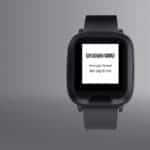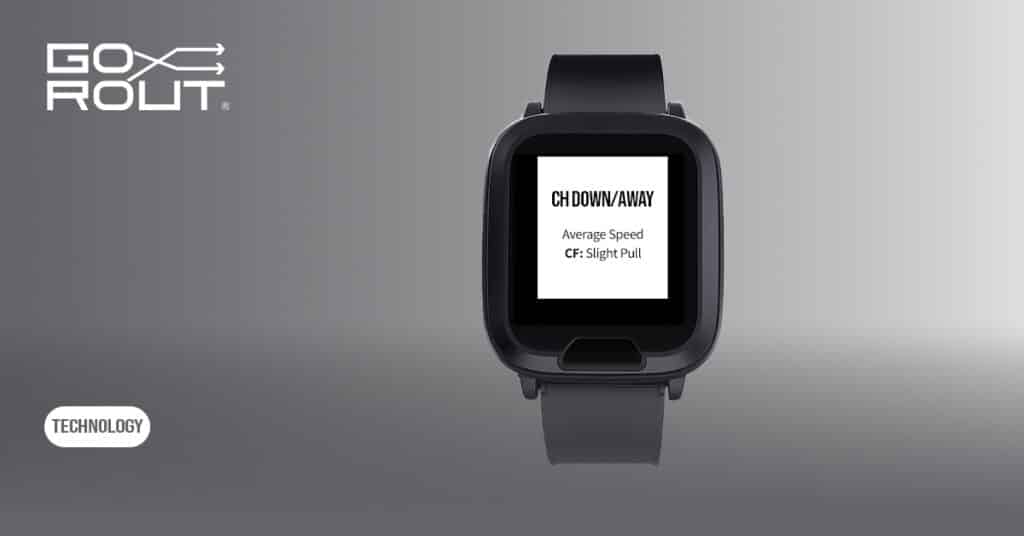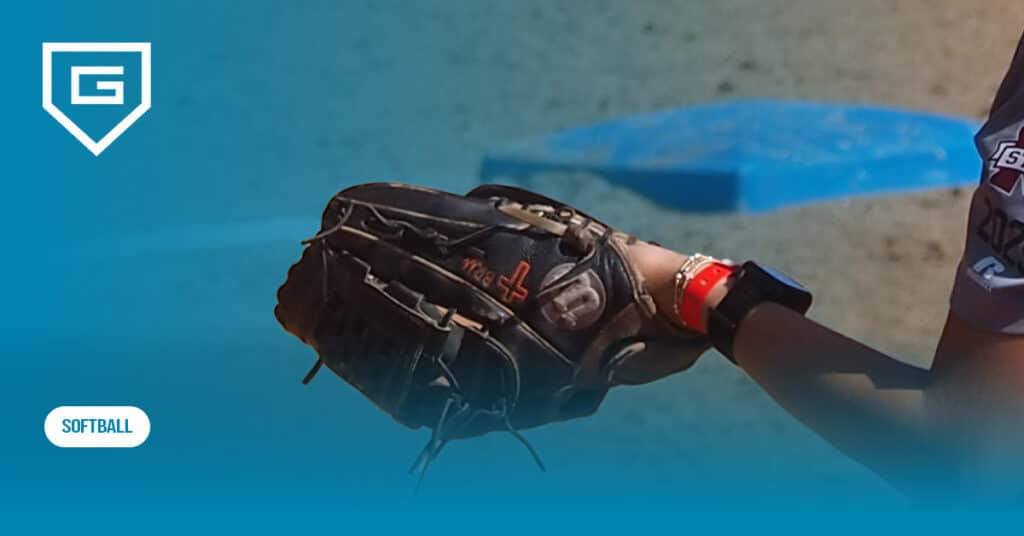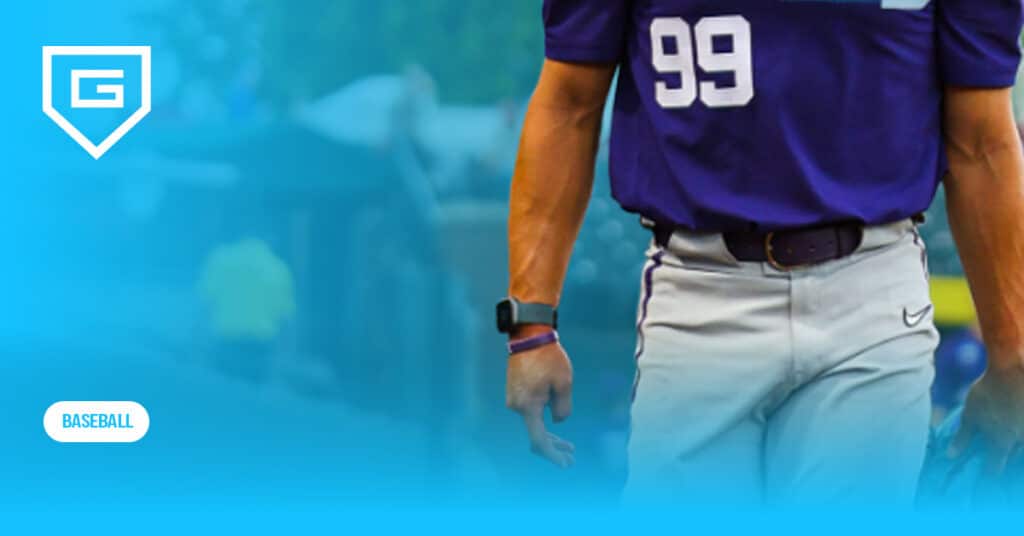Trends in Sports: A Deep Dive into the Evolving Landscape
Reading Time: 10 minutes
Reading Time: 10 minutes
The world of sports is constantly evolving, with new trends emerging daily. As a coach or member of a sports organization, it can be challenging to keep up with the latest advancements and stay ahead of the game.
From the GoRout coach-to-player communication system to video analytics and wearable tech, these innovations are changing the game for athletes and coaches.
At the heart of this transformation are data-driven coaching strategies, which give coaches remarkable insights into their players’ performance and allow them to make informed decisions about the team’s improvement.
Additionally, the latest trends in injury prevention and rehabilitation are helping athletes stay healthy and recover more quickly.
Join us as we explore the latest trends and technologies in sports, uncover the benefits of data-driven coaching strategies, and discuss how athletes and coaches adapt to stay ahead of the game.
The Impact of Technology on the Sports Industry

Innovative technology is transforming the sports industry. Athletes and coaches now use wearable devices and data analytics to track and optimize their training routines for better performance and injury prevention.
Broadcasting technology and virtual reality have personalized fan experiences by allowing them to engage with sports leagues in immersive and interactive ways.
Advanced systems like GoRout have enabled coaches to improve their communication with players on the field and make better decisions in sports like football, softball, and baseball.
The sports tech market has brought optimization and efficiency to the sports business, helping all sports organizations and leagues.
How American Football Aligns with Emerging Trends in Sports
American football incorporates emerging trends and immersive technology to improve gameplay and athlete performance, transforming team strategies and preparation.
Video analytics and play review systems
Video analytics and play review systems have become essential tools for coaches and players to gain valuable insights into team strategies, opponent tendencies, and individual performance.
Coaches rely on video analytics to examine game footage, identify patterns, assess player movements, and refine tactics for future games.
Similarly, play review systems, such as instant replay, allow officials to review controversial or close calls for accuracy. These playback advancements have transformed American football and improved the integrity and fairness of our favorite teams.
Impact of wearable technology and GPS tracking
Nowadays, football players use wearable devices equipped with sensors to track their heart rate, speed, acceleration, and distance covered during training and games.
This technology enables football coaches to stay informed about their players’ workload, fatigue levels, and the risk of injury to make smart decisions regarding player management and training regimens. The data also shows the effectiveness of football plays.
GPS tracking systems monitor players’ positioning, movement patterns, and performance in real time. Coaches use this data to make immediate adjustments to their scheme and alignments and identify areas for improvement.
Helmet safety technology for injury prevention
Football players are at risk of head injuries and concussions, but helmet safety technology is reducing these threats.
Modern American football helmets have advanced safety features, including impact-absorbing padding, reinforced shells, and specialized facemasks.
In the NFL, sensor-equipped helmets monitor and analyze the force and frequency of hits experienced by players during games and practices.
Advanced football practice systems
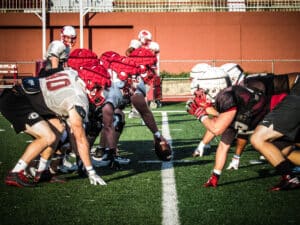
The GoRout football practice system has changed how thousands of coaches, players, and teams prepare and communicate on the field during practices and games. Teams using GoRout can achieve an average of 2.5 reps per minute, giving coaches more time to teach and players more opportunities to develop.
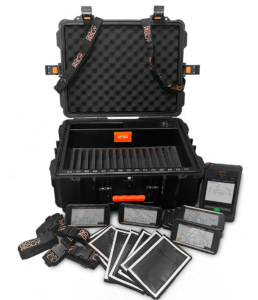
This football play-calling system includes user-friendly web and mobile applications for coaches to create football practice scripts and durable football wristbands for players. It maximizes practice efficiency and helps teams gain a competitive advantage on game day.
Football teams can now transfer real-time play data using GoRout Air™, an exclusive system that enables software and hardware to communicate through radio waves without requiring a Wi-Fi connection.
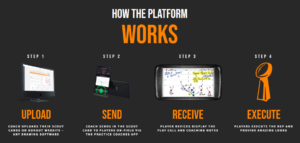
The versatility of the GoRout system is noteworthy, too. You can use it to:
- Run more plays with scout teams
- Walkthroughs
- 7 on 7 football
- Special teams (KO, KOR, P, PR)
- Prepare against up-tempo teams
- Reduce install times for new players
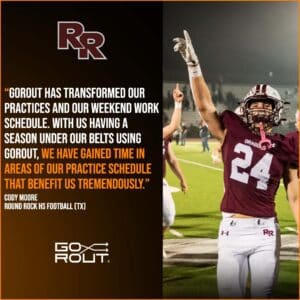
The GoRout football coaching gear is a game-changer for teams looking to improve their practice efficiency, communication, and performance.
Get a quote today.
How Softball and Baseball Adapt to Trends in Sports
The latest trends in sports coaching technology shape how athletes train and perform in softball and baseball.
These sports now use intelligent equipment to track performance, high-speed cameras, and radar technologies for detailed pitch and swing analysis.
Wearable sensors monitor player biomechanics, while advanced communication systems improve training efficiency and on-field decision-making.
The rise of smart equipment for performance tracking
Innovative technologies like smart bats and gloves help track athlete performance data during games and practice sessions.
This equipment offers real-time information on crucial metrics such as swing speed, launch angle, and biomechanical movements. With this data, coaches can fine-tune their strategies and optimize their training to achieve the best possible results.
Smart equipment also provides insights into player strengths and areas for improvement. Coaches can develop more personalized and effective coaching methods by closely examining an athlete’s performance.
High-speed cameras and radar technology for pitch and swing analysis
One of the primary trends in baseball and softball coaching is the use of high-speed cameras and radar technology to analyze pitches and swings.
These advanced tools provide coaches and players with information about the mechanics of pitching and hitting through velocity, trajectory, spin rate, and contact point data.
This data enables them to analyze every aspect of a pitch or swing in slow motion, which helps to fine-tune the technique.
Additionally, radar technology provides real-time feedback on pitch speed and movement. Based on these numbers, pitchers can adjust their approach, and hitters can anticipate pitches more effectively.
Wearable sensors for monitoring player biomechanics
Innovative solutions such as wearable technology in sports monitor the biomechanics of players in softball and baseball.
These devices are small and lightweight and placed on athletes’ bodies to track and collect data on movement patterns, joint angles, and muscle activity during gameplay and training.
A sports team can use these sensors to track athletes’ mechanics, identify inefficiencies, prevent injury risks, and optimize performance.
Wearable sensors can provide players with immediate feedback and adjustments to their technique. With data collected over time, coaches can create personalized training programs tailored to individual athletes’ needs.
Coach-to-player communication systems
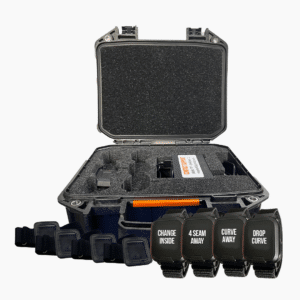
These systems allow coaches to convey strategic instructions to players in real time, such as specific plays, pitch calls, or shifts, based on the game’s flow and opponent data. It enables coaches to adapt their game plans dynamically.
GoRout Diamond for baseball and softball offers teams a simple experience with boundless opportunities for coach-to-player communication.

Coaches use this advanced technology to instantly communicate with every player on the field. With just one touch, coaches can relay pitch calls, defensive shifts, bunts, steals and hit-and-runs. The system is fully customizable, in-game compliant and eliminates concerns about players missing signs.
GoRout devices are designed to withstand bad hops and perform well in all weather conditions, such as high heat, humidity, snow, and rain. Each device is in-game compliant and has a 4-way privacy screen that ensures all communication between coaches and players is fully encrypted from transmission to reception.

The GoRout team has extensive experience working in the coach’s office, the locker room, and the field. This expertise has enabled us to create a system that integrates seamlessly into coaches’ workflows.
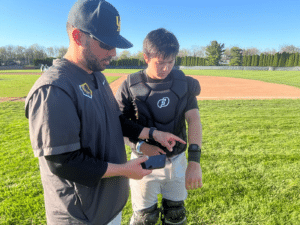
GoRout provides a fully customizable experience with packages that start with just one device and can be expanded anytime. There is no need for syncing, routers, setup, or WiFi.
Get a quote today.
Data-Driven Coaching Trends in Sports
Sports coaches are adopting data-driven coaching trends using artificial intelligence (AI) and machine learning. They use digital analytics for performance management to enhance training programs, improve game plans, and boost player potential.
Additionally, big data analytics in the sports industry helps scout and recruit talented players. It helps identify promising athletes based on their play strengths and performance metrics.
AI and machine learning for performance analytics
Artificial intelligence and machine learning are new technologies that provide coaches and analysts with a wealth of data on player performance.
These technologies analyze player statistics, biometric data, and game footage to identify patterns, trends, and areas for improvement in all sports.
By using AI and machine learning for performance analytics, sports clubs can make data-driven decisions that optimize training, enhance their strategies, and maximize player performance on the field.
The use of big data for scouting and recruiting talented players
Data analytics is valuable for scouting and recruiting talented players.
By analyzing extensive player statistics, performance metrics, and scouting reports, teams can uncover a player’s potential and determine their suitability for their sports organizations.
Teams use performance data to identify undervalued prospects, predict future performance, and make informed recruitment decisions. It enhances the quality of player acquisition and gives teams a competitive edge by building successful rosters.
Injury Prevention Trends in Sports
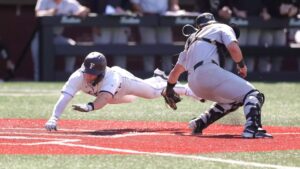
Preventing injuries is crucial in sports, and the latest technology focuses on innovative approaches to player health and recovery.
The industry constantly integrates sports medicine technology, biometric monitoring, and new rehabilitation tools and techniques to optimize athlete health.
The goal is to mitigate injury risks and expedite recovery, allowing athletes to perform at their best while minimizing the likelihood of setbacks.
Sports medicine technology for player health and recovery
Sports medicine technology has advanced significantly, providing athletes and medical professionals with tools to monitor vital signs, track workload, and customize training programs and recovery protocols.
These technologies allow for proactive management of player health.
Advanced diagnostic tools, like MRI and CT scanners, accurately assess injuries, enable timely interventions, and personalize treatment plans. Innovative regenerative therapies, including PRP injections and stem cell treatments, accelerate the healing and recovery process from injuries.
The role of biometric monitoring in preventing injuries
Biometric monitoring is a method for tracking metrics such as heart rate variability, sleep patterns, and hydration levels. It helps identify signs of fatigue, overtraining, or increased injury risk.
Coaches can take proactive measures and adjust training loads, modify recovery protocols, or implement targeted interventions to mitigate injury risks before they occur.
Biometric monitoring is an effective tool for athletes to optimize their workout by ensuring they are training at the appropriate intensity levels based on their responses.
New rehabilitation tools and techniques for injured athletes
New tools and techniques for rehabilitation are helping athletes to heal and rehab. These advancements include state-of-the-art physiotherapy equipment, regenerative therapies, and innovative rehabilitation protocols.
Cutting-edge technologies, such as virtual reality rehabilitation programs and robotic-assisted therapy devices, provide interactive experiences that target muscle strengthening, range of motion exercises, and functional movement training.
Holistic rehabilitation methods now incorporate mindfulness practices and psychosocial support. These approaches address the mental and emotional aspects of recovery and promote resilience and well-being throughout the rehabilitation process.
Virtual and Augmented Reality Trends in Sports
Emerging technologies such as virtual and augmented reality (VR and AR) have the potential to offer a more immersive experience to athletes, brands, and sports fans.
These technologies can help sports enthusiasts engage more deeply when watching games and interact more effectively with various sports leagues.
They can also be useful tools for athlete training and simulation, as they provide realistic scenarios and immediate feedback that can enhance player performance.
VR for visualization and professional sports training
Virtual Reality (VR) is one of the latest trends female athletes use for visualization and professional sports training. The new technologies enable athletes to envision plays, strategies and scenarios in detail.
It helps athletes with decision-making, spatial awareness, and situational understanding.
VR training programs enhance performance by closely mimicking real-game situations, including high-pressure scenarios, refining techniques and rehearsing game plans.
Coaches and trainers leverage VR technology to design customized training tailored to the needs of their sports teams or individual athletes.
AR for real-time performance monitoring
Augmented reality (AR) is changing how coaches monitor real-time sports performance.
AR enables athletes to wear smart glasses or helmets with sensors that capture data on their speed, distance covered, heart rate, and biomechanical movements by superimposing digital information onto the physical environment.
It enables coaches to monitor their performance in real time without interrupting the training, as they can see the data in real time.
Coaches can also use AR applications to provide real-time feedback to athletes. They can annotate live video feeds or overlay instructional graphics onto the athlete’s view, providing instant feedback on technique, positioning, and strategy.
Sustainable Equipment and Apparel Trends in Sports
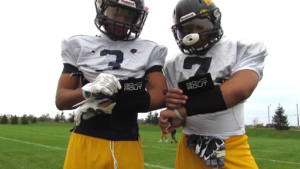
The sports industry is experiencing a shift towards sustainability and a positive environmental impact. It is particularly apparent in the equipment and apparel sector, where manufacturers increasingly incorporate eco-friendly materials.
As people become more aware of environmental issues, there is a growing demand for sports gear made from recycled and renewable materials. It helps minimize waste.
For instance, many cleats are now made from recycled plastics, some sports gear is constructed from bamboo, and jerseys are crafted from organic cotton.
This trend towards environmentally conscious products is contributing to reducing the sports industry’s overall environmental impact.
Esports and Its Influence on Traditional Sports
Esports is gaining immense popularity worldwide with its competitive gaming tournaments and digital engagement for sports fans. The growth of esports has led to the emergence of new trends in the sports industry by merging two markets.
Traditional sports clubs and companies are embracing and investing in this new-age fan experience.
A recent article highlights how the intersection of esports and traditional sports offers a glimpse into the future of sports entertainment, where virtual competitions and traditional sports converge to redefine athletic competition.
Conclusion
As these trends continue to shape the future of sports, it’s important to stay ahead by incorporating cutting-edge technology like GoRout into your team’s strategies.
GoRout’s advanced communication technology allows for seamless communication between coaches and athletes, maximizing performance and minimizing errors on the field.
Using GoRout’s coach-to-player communication system, you can improve communication flow, better understand your team’s performance, and enhance player development.
Take advantage of the opportunity to elevate your team’s game. Get a quote from GoRout today.
FAQs about Trends in Sports
What is the sports industry trend in 2024?
Five significant trends will likely shape the sports industry in 2024. These include the evolving economics of sports, the increasing use of generative AI, the future of large-scale events, investments in fan data, and the possibility of a new paradigm in college athletics.
What are the new ideas in sports?
The sports technology industry is constantly evolving towards greater optimization. It includes a range of products such as wearables, data tracking and collection tools, injury prevention solutions, event management software, goal-line technology, communication systems, and virtual reality systems that contribute to sports science and technology.
What is the next big trend in the sports and event industry?
The next big trend in the sports and events industry is league expansions, streaming platforms and AI-driven personalized fan experiences and engagements. Artificial intelligence is at the forefront of this revolution. It can now personalize fan experiences on a large scale.

